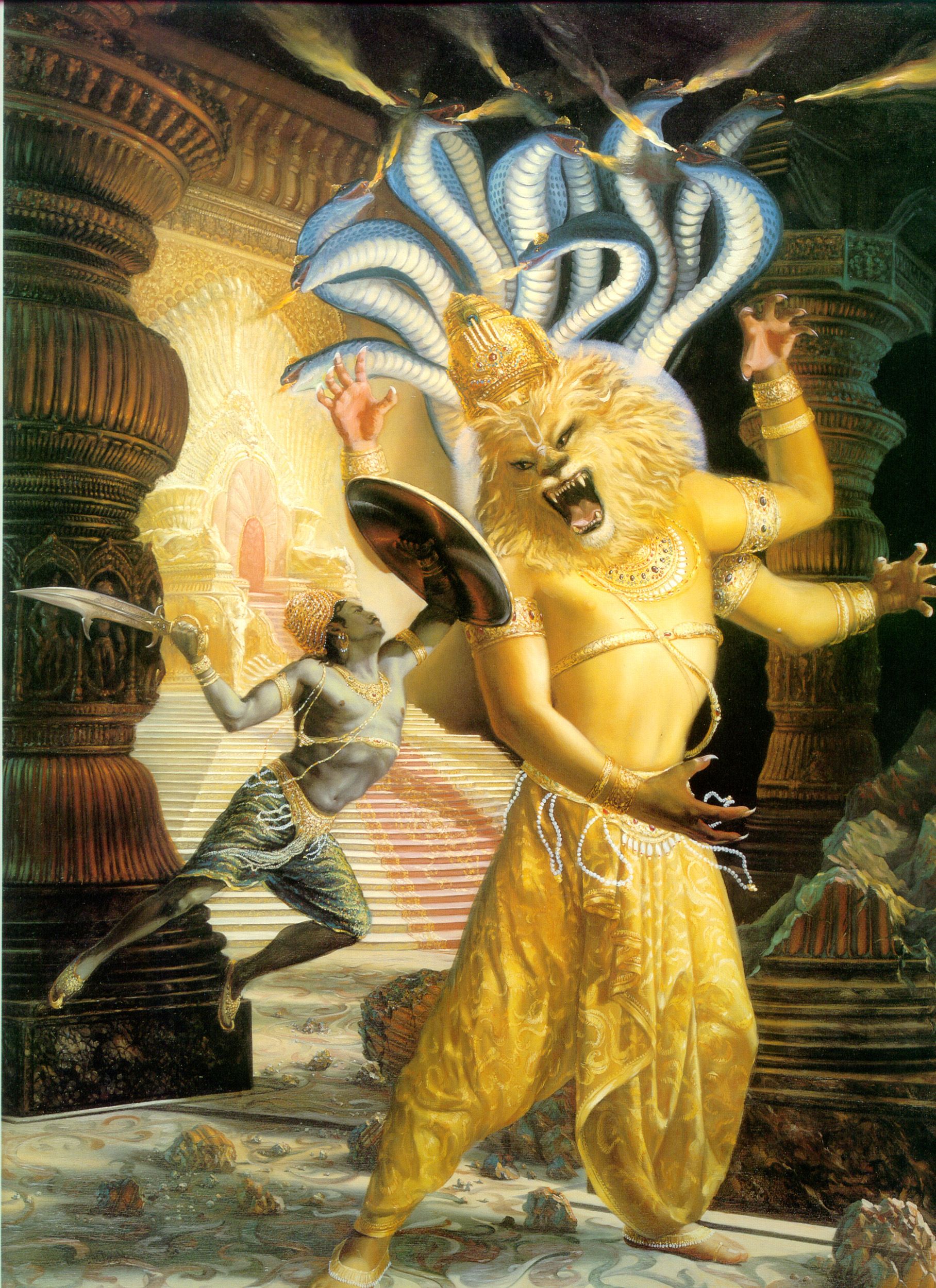|| Śrī Narasiṁha Nakha Stutīḥ ||

Hymn to Śrī Nṛsiṁha’s Nails
By Śrīman Madhvācārya
Legend has it that Śrī Madhvācārya would perform his daily worship privately and ask his disciples to wait elsewhere until he was finished. One day, Śrī Trivikrama Paṇḍitācārya (a former Śaṅkaraite ācārya), was so overcome with curiosity that he made a small hole in the wall of the temple to look through. What he saw within stunned him into total awe: Śrī Madhvācārya was performing his worship in three different forms at once! As Śrī Hanumān, he was serving Śrī Rāmacandra, as Śrī Bhīmasena, he was serving Śrī Vāsudeva Kṛṣṇa, and as Śrī Madhvā, he was worshipping Śrī Vyāsadeva. Tears of wonder rolling down his face, Trivikrama Paṇḍitācārya began to compose the forty-one verses of his famous Vāyu-stutī then and there. The omniscient Śrī Madhvācārya thereafter blessed his dear disciple with the following two verses in praise of Śrī Narasiṁha-deva’s nails and ordered him to recite them at the beginnning and end of his Vāyu-stutī.
पान्त्वस्मान् पुरुहुत वैरि बलवन मातङ्ग माद्यद्घटा
कुंभोच्चाद्रिविपाटनाऽधिकपटु प्रत्येक वज्रायिताः |
श्रीमत्कण्ठीरवास्य प्रतत सुनखरा दारिताराऽतिदूर
प्रद्ध्वस्त ध्वांत शांत प्रवितत मनसा भाविता भूरि-भागैः || १ ||
pāntvasmān puruhūta vairi balavan mātaṅga mādyad-ghaṭā kumbhoccādri-vipāṭanā ’dhika-paṭu pratyeka vajrāyitāḥ |
śrīmat-kaṇṭhīravāsya-pratata-sunakharā dāritārā’tidūra |
pradhvasta dhvānta śānta pravitata manasā bhāvitā bhūri-bhāgaiḥ || 1 ||
pāntu - protect; asmān - us; puruhūta - Indra; vairi - enemies; balavan - formidable; mātaṅga - elephants; mādyad - intoxicated; ghaṭā - a troop of elephants assembled for military purposes; kumbho - the frontal globes or prominence of an elephant’s upper forehead which swell during rutting season; ucca - high; adri - mountain; vipāṭana - to split into two; adhika - more; paṭu - skilled; prati - every; eka - one; vajrāyitāḥ - like thunderbolts; śrīmat - accompanied by Śrī (Lakṣmī-devī); kaṇṭhīrava - lion, lion’s roar; āsya - face, jaws; pratata - spread throughout; su - beautiful, complete, worshipful; nakharā - nails; dārita - torn; arā - an awl (a small pointed tool used to pierce holes in leather); atidūra - very far apart; pradhvasta - annihilated; dhvānta - a roaring wind, darkness; śānta - peace; pravitata - spread out, dishevelled; manasā - mind; bhāvitā - the state of being, predestination; bhūri - abundant, numerous; bhāgaiḥ - portions.
Protect us from the formidable enemies of Indra who are like intoxicated elephants in martial formation. However, each and every one of Your nails is like a thunderbolt and extremely well-adapted to tearing apart the tall mountain-like mounds of their heads. The roar and jaws of Thy beautiful lion-face are spread wide as Your perfect nails pierce and tear the demon’s apart like an leatherworker’s awl, scattering them across great distances. Thus You annihilate the howling darkness and pacify the dishevelled state of our minds by that numerous array [of nails].
[Note 1: Alternative reading: nakha-vṛndaiḥ, “the multitude of His nails”. Also, Śrī Madhvācārya displays noteworthy poetic skill in his composition here by combining two vṛtta-chandas (syllabic metres) in one verse. To construct even a single intelligible composition in one prescribed metre is no small feat, as each of the four lines must contain a specific number of syllables and make sense, let alone be poetic and philosophically profound. In the first half of these verses, he uses the Śārdūla-vikrīḍita metre, which means “that which is made a tiger or lion’s plaything”. In the second half, he uses Sragdharā, which means “that which wears a garland”. Thus the chandas express both the playful pacing of Śrī Narasiṁhadeva’s tussle with His elephantine prey and the shocking, gruesome finale of said prey’s intestines draped about His neck.]
लक्ष्मीकान्त समन्ततोऽपिकलयन नैवेशितुः ते समम् |
पश्याम्युत्तमवस्तु दूरतरतोऽपास्तं रसो योऽष्टमः|
यद्रोषोत्कर दक्षनेत्रकुटिलः प्रान्तोत्थिताऽग्नि स्फुरत |
खद्योतोपम विस्फुलिङ्ग भसिता ब्रह्मेश शक्रोत्कराः || २ ||
lakṣmī-kānta samantato ’pi kalayan naiveśituḥ te samam |
paśyāmy-uttama-vastu dūra-tarato ’pāstaṁ raso yo ’ṣṭamaḥ |
yad-roṣotkara dakṣa-netra-kuṭilaḥ-prāntotthitā ’gni sphurat |
khadyotopama-visphuliṅga bhasitā brahmeśa-śakrotkarāḥ || 2 ||
lakṣmī - Goddess of Fortune; kānta - beloved; samantatas - on all sides; api - unto; kalayan - perform; na - not; iva - like; īśituḥ - master; te - that; samam - equal; paśyāmi - I see; uttama - topmost; vastu - entity, object; dūratarataḥ - of a great distance; āpāstaṁ - thrown off; rasaḥ - mellow, flavor; yaḥ - from which; aṣṭamaḥ - eighth; yad - who; roṣotkara - rising anger; dakṣa-netra-kuṭilaḥ - Your third eye; kuṭilaḥ - crooked, curved; prānta - corner; utthitā - arising; agni - fire; sphurat – burst forth; khadyota - fireflies; upama - resemblance; visphuliṅga - sparks; bhasitā - consumed, burnt to ash; brahmeśa - Brahmā and Śiva; śakrotkarāḥ - Indra and his hosts of demigods.
O beloved of Lakṣmī Devī, though I have made a thorough study of all the scriptures, I see no one who is equal to You as master and granter of boons. You by far surpass the best of all that exists, which makes You the eighth rasa. Many multitudes of Brahmās, Śivas, Indras and their entourages are reduced to ash by the sparks of fire resembling glittering fireflies issuing from the curved edge of the rising mass of wrath that is Your right (or third) eye.
[Note 2: There are only six rasas, or flavors, namely: sweet, salty, sour, spicy, bitter, and astringent. There is no seventh rasa. So an eighth is simply beyond human comprehension, which aptly describes the position of Bhagavān. Another interpretation of this can be traced to the Chāndogya Upaniṣad (1.1.2): “The essence of all beings is the Earth (first rasa), the essence of Earth is water (second rasa), the essence of water is plants (third rasa), the essence of plants is man (fourth rasa), the essence of man is speech (fifth rasa), the essence of speech is the Ṛg Veda (sixth rasa), the essence of the Ṛg Veda is the Sāma Veda (seventh rasa), and the essence of the Sāma Veda is the udgītha or praṇava (oṁkāra, or Śrī Hari Himself, the eighth rasa).”]
